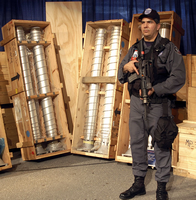Cuba became the 54th national government to accede to the U.N.'s Nuclear Terrorism Convention on June 17, in a move meant to burnish the island nation's counterterrorist credentials, which have been contested by the United States and other foreign governments. In depositing Havana's instrument of accession to the International Convention for the Suppression of Acts of Nuclear Terrorism, as the convention is formally known, the Cuban mission to the U.N. issued a statement affirming the Cuban government's "irrevocable commitment to the fight against terrorism under in all its forms and manifestations."
The Cuban government also exploited the occasion to contest the legality of the U.S. naval base at Guantanamo Bay, where hundreds of suspected terrorists have been detained since 9/11. The statement said that Cuban authorities could not enforce the convention on the base since it is located in Cuban territory "illegally occupied by the United States," over which the Cuban state "does not exercise its rightful jurisdiction." The Cuban government claimed that, as a result, it could not verify whether the U.S. "has installed, possesses, keeps or has the intention to install nuclear materials, or even, nuclear weapons" in that part of the island.
The publicity surrounding this contretemps did have the benefit of highlighting the steady progress the convention has achieved in gaining wider acceptance. The Nuclear Terrorism Convention entered into force on July 7, 2007, or 30 days after the 22nd country, in this case Bangladesh, deposited its instrument of ratification.

